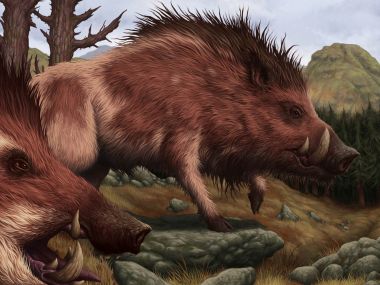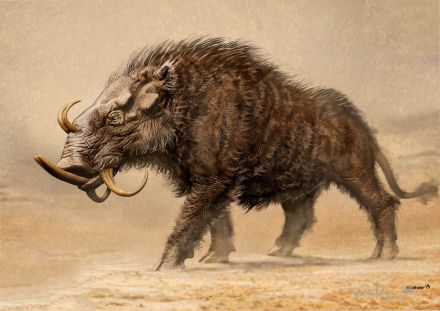Difference between revisions of "Boar (wild)"
Tao alexis (talk | contribs) |
Tao alexis (talk | contribs) |
||
| Line 19: | Line 19: | ||
}} | }} | ||
| − | A native of the | + | A native of the Old World, this beast was the ancestor of most pig breeds, being domesticated in China about 8,000 years ago. The boar is more heavily built than the pig, with a muscular neck, well-developed canine teeth and unusual aggression — giving the boar +1 [[Roll to Hit|to hit]] in combat. Wild boars are able to leap upwards a distance of four to five feet; because of their surefootedness, they willingly hunt along rocky hillsides. |
| − | + | Boars communicate through grunts and hunt familiar territories. Though solitary in temperament, they will nevertheless remain near their own kind; this loose group is called a "sounder." The core sounder is female dominated, made up of young female boars and their mothers. When hunting falls off and new territories are sought, it is this female group that begins the trek outwards. During the breeding season, from November to January, males will rejoin the sounder. | |
| − | |||
| − | |||
| − | |||
| − | |||
== Hylochloerus == | == Hylochloerus == | ||
| Line 49: | Line 45: | ||
}} | }} | ||
| − | Also called the giant boar, | + | Also called the giant boar, this terrifying beast is unlikely to be found near inhabited areas. It is more aggressive than its smaller cousin, receiving a +2 to hit when attacking. It will bite with its powerful jaws and long lower teeth (9 to 11 in. in length), while hooking with one horn or the other (either, but not both). It may focus both attacks against a single defender or split its attacks. |
| − | + | Hylochloerus have been caught and caged, then released upon battlefields to break the will of the enemy. Despite its aggression, the animal is markedly [[Intelligence (ability stat)|intelligent]] and perceptive. They have been used as reliable watch-animals for druids and rangers, giving as much loyalty as might be expected from a [[Dog (domestic)|dog]]. | |
<br> | <br> | ||
<br> | <br> | ||
See [[Bestiary]] | See [[Bestiary]] | ||
Revision as of 23:14, 16 March 2020
| Species | swine (boar) |
| No. Appearing | 3–18 |
| Behaviour | subsocial (sounder) |
| Range | jungle, rainforest, savanna, woodland |
| Size | 39 in. at shoulder |
| Weight | 200 lbs. |
| Intelligence | 3 |
| Armour Class | 7 |
| Hit Dice | 3+3 |
| Action Points | 5 |
| Max. Stride | {{{stride}}} |
| THAC0 | 17 |
| Hp/Die | d8 |
| Attack Forms | bite |
| Damage | 3–12 |
| Special Attacks | aggression |
A native of the Old World, this beast was the ancestor of most pig breeds, being domesticated in China about 8,000 years ago. The boar is more heavily built than the pig, with a muscular neck, well-developed canine teeth and unusual aggression — giving the boar +1 to hit in combat. Wild boars are able to leap upwards a distance of four to five feet; because of their surefootedness, they willingly hunt along rocky hillsides.
Boars communicate through grunts and hunt familiar territories. Though solitary in temperament, they will nevertheless remain near their own kind; this loose group is called a "sounder." The core sounder is female dominated, made up of young female boars and their mothers. When hunting falls off and new territories are sought, it is this female group that begins the trek outwards. During the breeding season, from November to January, males will rejoin the sounder.
Hylochloerus
| Species | swine (boar) |
| No. Appearing | 2–8 |
| Behaviour | subsocial (sounder) |
| Range | rainforest, savanna |
| Size | 5 ft. at shoulder |
| Weight | 1,600 lbs. |
| Intelligence | 3 |
| Armour Class | 6 |
| Hit Dice | 7 |
| Action Points | 5 |
| Max. Stride | {{{stride}}} |
| THAC0 | 13 |
| Hp/Die | d12 |
| Attack Forms | bite, horn |
| Damage | 5–20, 1–10 |
| Special Attacks | aggression |
Also called the giant boar, this terrifying beast is unlikely to be found near inhabited areas. It is more aggressive than its smaller cousin, receiving a +2 to hit when attacking. It will bite with its powerful jaws and long lower teeth (9 to 11 in. in length), while hooking with one horn or the other (either, but not both). It may focus both attacks against a single defender or split its attacks.
Hylochloerus have been caught and caged, then released upon battlefields to break the will of the enemy. Despite its aggression, the animal is markedly intelligent and perceptive. They have been used as reliable watch-animals for druids and rangers, giving as much loyalty as might be expected from a dog.
See Bestiary

